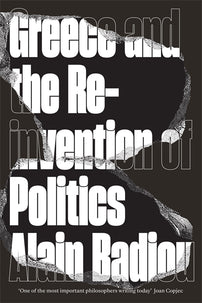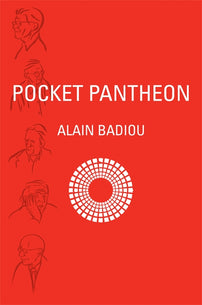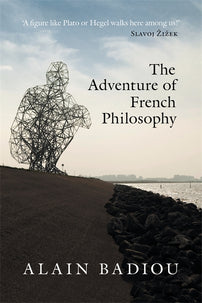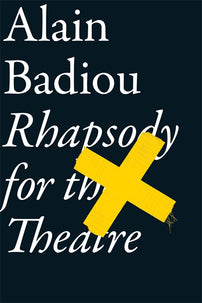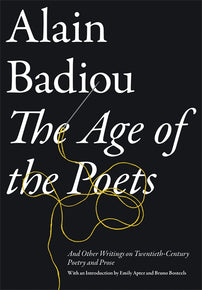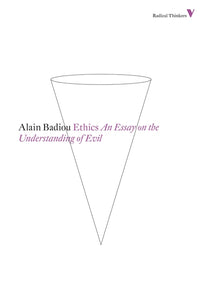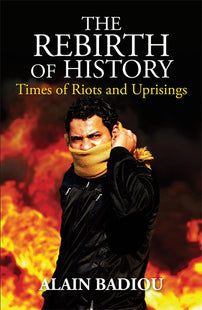Alain Badiou: "Ultimately it is revolutionaries alone who offer a true balance sheet of revolutions"
With the publication of Que signifie "changer le monde"? [What does 'changing the world' mean?], a new book based on his seminar, Alain Badiou looks back on what attaches him revolutionary hope.

First published in Le Monde.
On 16 January, a long and emotional gathering took place at the Théâtre de la Commune in Aubervilliers (Seine-Saint-Denis). Here, the philosopher Alain Badiou wanted to mark both his 80th birthday and the 50-year running of his famous seminar, offering the faithful a last session of public reflection.
Launched in 1966, this seminar has moved between the Collège universitaire de Reims, the Université Paris-VIII, the Collège international de philosophie, the l’Ecole normale supérieure and, finally, here at the Théâtre de la Commune.
All of this seminar work since 1983 is going to be published by Fayard, which has already published nine such volumes. The most recent one covers the years 2010-2012 and is entitled Que signifie “changer le monde”? Here, between two pieces commenting on current affairs, Alain Badiou works his way through Western texts from Plato’s dialectic to Lacanian psychoanalysis, via Rousseau’s novels and the theatre of Brecht. He does this in order to examine the future of "the old watchword of revolution."
In your Explication (together with Alain Finkielkraut, Lignes, 2010) you said "I love my country, France — and I am comfortable with saying so." What place does the heritage of 1789 have in this love?
A decisive one. For my love of France does not owe to its general historical allure. In France, there is this sort of solid, encrusted bedrock of conservatism. If we look at the historical episodes that made for France’s universal glory, from the storming of the Bastille to May ’68, via the revolutions of 1848, the Paris Commune, and the Popular Front, France has the sorry privilege of having the greatest massacres of workers in revolt (June 1848, the Commune). It has had a sorry privilege in terms of its consent to authoritarian regimes appreciated by the business world for their servility, from Napoléon le Petit to Macron le Très Petit. And particularly squalid, there has been a marked preference for national betrayal when the common people has struck fear into "the upstanding": from the Restorations of 1815 to the capitulation of 1871, and Pétain in 1940.
So yes. Seeing this continuity of reaction, it is, rather, the France of 1792 and 1794 that makes me love this violently contradictory country.
In your seminar, you say that the "dominant propaganda" imposes a "curfew" on the memory of revolutions, and that this makes it impossible to understand them. Do you not think that the heirs to these revolutions also have some share in the responsibility for this, in so often refusing to draw a balance sheet of their results?
That depends who you call an "heir" to a revolution. I think that would have to mean someone who continued the politics of their predecessors, beyond all the setbacks and renunciation. But what are we looking at, then? All Leninism proceeds from a balance-sheet of the Paris Commune, which even Marx had begun to make. And Mao’s political life was founded on a series of critical assessments of all the revolutionary toolbox of his age. Take the critique of the Third International, when he understood that the urban insurrectionary path was doomed and that what was needed was deployment in the countryside; the virulent critique of Stalinism, when he saw that the form of economic development imposed on the USSR had become foreign to any communist orientation; and the revolutionary critique of his own party, which, indeed, it was necessary to embark upon following in the wake of the USSR itself.
Clearly, reaction will always demand that everyone should share its totally negative "assessment" of revolutions — generally reduced to absurd crimes, whether by Robespierre, Lenin, Stalin or Mao. But ultimately it is revolutionaries and they alone who offer a true balance sheet of revolutions.
You say "absurd crimes." Yet there are philosophers like Claude Lefort who consider that any emancipatory perspective will continue to be in vain so long as the Left do not seriously confront the question of totalitarianism, starting with the crimes of Stalin… or of Mao.
The word "totalitarian" is a fine summary of the shabby and false "assessment" of the great revolutions of the twentieth century — or even, the whole sequence opened up by the French Revolution — that is offered us by our masters and their intellectual servants.
What unified "totality" held together Stalin and Trotsky, or Mao and Liu Shaoqi? Their conflicts were clearly a matter of a fight between two strategic paths for the future development of the "socialist states" — one strategic path oriented to these states’ perpetual consolidation, and one directed to the communist withering-away of the state.
What "totalitarianism" is there where one of these paths rests on the police and army, and the other on mobilisations of youth and workers which were historically unprecedented in terms of their divided, multiform, democratic dimensions?
We might seek to draw a balance-sheet of the violence in the socialist countries. But to do this we have to begin by clarifying the major contradiction that there was between the capitalist road and the communist road, amidst the totally unprecedented conditions of these states’ existence. And certainly not by basing ourselves on categories like "totality" and "crimes," which have no aim or use other than to liquidate the communist hypothesis and establish a sinister consensus around globalised capitalism.
Every revolution poses the question of organisation, or in other words a collective discipline that remains "faithful to disorder," as you put it. Among recent experiments, you were unconvinced by the Nuit Debout movement (see Badiou’s upcoming Greece and the Reinvention of Politics, Verso, 2018). Why was that?
Nuit Debout did not amount to much "disorder." It was certainly a pleasant piece of "democratic" chatter. But it did not begin from any serious assessment of even very recent examples of powerful mass movements.
In recent years, there were other square occupations that were vaster and longer-lasting than Nuit Debout, more "of the people." All of them ended in terrible political impasses because they were unable to resolve the problem of organisation, and therefore the problem of what lasts beyond the movement itself. Take the examples of what al-Sisi did after Tahrir Square, or Trump in the USA after Occupy Wall Street, or Erdogan after the powerful movement in Turkey, or Tsipras in Greece doing the opposite of what the people in revolt had been demanding for years…
So how did those on the Place de la République position themselves, in light of these violent setbacks? What assessment did the participants in the French movement — the last of them to arrive, historically speaking — draw from these latter?
In your seminar, you often say "we." For example, you ask "What might we — we — think about this?" Who are "we"?
The seminar is an address to a numerous and largely faithful audience. It is living, present. So, in this situation, when I say "we" I am referring to the crowd that is present, including myself.
If I read or comment on a document, a poem, a philosophical text, a recent action, a political thesis, for me the important question is to know what I think about it and then to communicate this. And it should be understood that I only do this so that those present can share my own question for a moment and participate, subjectively, in the move to respond to it.
In his seminar, Roland Barthes compared speech and listening to the comings and goings of a child playing around their mother. What image comes to your mind of your own seminar, which concluded in a theatre?
The image that comes to my mind is that of a monologue in a play. The character, which means the actor, comes to tell an attentive public — strictly for their own use — what he thinks, what is tormenting him, the general lesson that he takes from all this.
For me, as Lacan might have said, the mode of discourse proper to the exercise of philosophy is the Master’s discourse. The audience, for its part, is in the place of the Hysteric, namely the place of those who are simultaneously both seduced by this discourse and the bearers of latent objections.
Sometimes secretly, sometimes publicly, the Master always challenges this audience to respond to these objections. Hence the tension that I feel when I come onto the stage: am I going to convince the audience, and not simply seduce them? It is also through this seduction/conviction couple that philosophy is tied to theatre.
At your last seminar, you left the stage with a simple "Good night to you all," without saying anything more grandiose or inviting your audience to mark the occasion in a more festive spirit. The rest of us, sat in "the place of the Hysteric" found this to beat some remove from the revolutionary tradition….
I have never considered my seminar as a site of politics, properly speaking. When I am in a hostel populated by workers from Mali, Morocco or the Ivory Coast, and I discuss the paths of their liberation with and among this international, nomadic proletariat, then I am doing politics. When I am the figure of the philosopher-Master, I am conditioned by politics, as well as by art, science and love. So, there were no grounds for playing at the "revolutionary tradition" or mimicking festive activities. We headed our separate ways, in what I believe is a serious friendship.
[book-strip index="1" style="display"]
